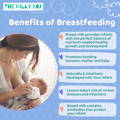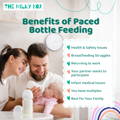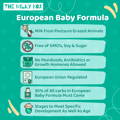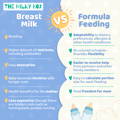Breastfeeding is recommended to be started right after birth. If there are no complications, many hospitals encourage breastfeeding during the first skin-to-skin contact with the mom. It has been proven that breastfeeding has shown to be more successful when this first feeding occurs early. Don’t be scared to try!
Comparing Breastmilk and Formula: What's Best for Your Infant?
By: Dr. Maria Cerino - October 4, 2023 - 8 Minute Read

If you’ve been researching, you must have heard the term “nature’s perfect food” a million times when referring to breast milk. It’s inescapable, and it’s all over the internet. Is it the only way to go? Why do some moms stick to formula exclusively? Is mixing both even an option?
In this article, we will discuss breast milk's natural benefits and shed some light on its biggest contender: Formula.
Table of Contents:
1. What's in Breast Milk?
2. Health and Safety Issues
3. Overcoming Breastfeeding Problems
4. Are Breast-fed Babies Healthier?
5. Baby Formula Most Like Breast Milk
6. What's Better for Babies Breast Milk or Formula?
7. Do Babies Need More Formula Compared to Breast Milk?
8. The Benefits of Breastfeeding vs. Bottle Feeding Formula
9. Bottom line
10. Frequently Asked Questions
What's in Breast Milk?
Let’s start with the basics: Breast milk is indeed the most natural and intuitive way to give our babies the nutrition they need to develop. Through every era in history, it has been proven that breastfeeding is the way to ensure babies grow on all-natural sources.
Not only that, but breast milk is dynamic. It adapts to every child’s particular needs: it thins out when dehydrated to replenish their water storage, and antibody content rises when they’re sick to protect them. A mother and her baby are often in the same environments and, therefore, exposed to the same pathogens.
This ensures their antibodies are customized to protect the baby against the specific pathogens they are most likely to be exposed to. Another big point for breastfeeding is the bond it creates between baby and mom. It also provides a sense of calmness, affection, and comfort for both parties.

Health and Safety Issues
What happens when mom suffers from health issues? We consider it extremely important to open up this conversation. Breast milk is recommended for all infants as long as the mother’s production allows.
There are some instances where breastfeeding isn’t recommended due to health and safety issues:
• When the mother suffers from alcoholism or drug addiction
• Mothers with an HIV infection and are not on antiretroviral therapy or have not achieved sustained viral suppression during pregnancy (at a minimum throughout the third trimester) or at the time of delivery
• Mothers with an active Ebola infection
• Mothers infected with human T-cell lymphotropic virus type I or type II
• Mothers receiving cancer drugs
• Mothers currently taking epilepsy drugs
If you’re pregnant and experiencing one of these situations, there is nothing to worry about. It’s best to talk to your qualified practitioner and plan together the best formula-based diet for your baby.
Overcoming Breastfeeding Problems
Even when breastfeeding seems to be the most natural thing in the world, it’s not rare to face difficulties in this process.
These are the most common breastfeeding issues that affect milk production in significant ways:
● Clogged breast ducts
● Breast tenderness & nipple soreness
● Breast engorgement
● Diminished milk production
● Breast infection (mastitis)
It’s worth it to do all that’s in reach to overcome them. Perfecting the feeding technique and switching around our baby’s position can be enough to prevent soreness. There are highly informative online resources that cover this perfectly.
Breast engorgement is a common issue that often requires frequent feeding or pumping, and it takes mom a few weeks to get right in tune with her body. Don’t be scared to reach out to your health provider and ask for help. However, there is no shame in choosing a formula if these difficulties don’t resolve over time.

Are Breast-fed Babies Healthier?
There is no denying that breastfeeding provides invaluable benefits to a baby’s health. It has been proven that it reduces the likelihood of developing allergies and asthma, thanks to the high antibody count that human milk provides.
It also has been found to reduce the risk of developing cancer in childhood, as well as childhood obesity and more.
European Baby Formula
However, this doesn’t necessarily mean that formula-fed babies can’t have healthy and long lives. As we know, health depends on nutrition and a dozen other factors. If formula feeding is consistent and you choose a nutritious, high-quality formula, you can effortlessly provide your baby with everything they need.
Baby Formula Most Like Breast Milk
Although breast milk is the recommended source of nutrition for infants, European infant formulas are a nutritious alternative that can supplement or replace mother's milk. These formulas are specifically designed to mimic the nutrients that are present in breast milk, such as proteins, fats, carbohydrates, vitamins, and minerals.
European Baby formulas undergo rigorous testing and quality control measures to ensure that they are safe and nutritionally balanced for infants. European infant formulas can be a valuable option for mothers who cannot breastfeed or for those who choose not to breastfeed.

What's Better for Babies Breast Milk or Formula?
The truth is that there is no right answer to this question. Objectively, breast milk offers plenty of benefits that are valuable to a child’s development. However, this doesn’t take away from the supplemental benefits that high-quality formula can offer.
The American Academy of Pediatrics and the World Health Organization advocate for exclusive breastfeeding during the first 6 months of a baby's life. If you’re able to stick to that guideline, we encourage you to go for it.
Switching to a formula is an exceedingly difficult decision for many parents to make, often plagued with judgment from other parents. It’s extremely helpful to remember millions of babies have grown up on exclusive formula diets and they have grown into healthy adults, therefore it’s important to make this choice on your terms.
Choosing the right formula might just be the step you need to feel confident about your choice, no matter the circumstances that have led you to this choice. As a parent, you have every right to make these decisions freely and without feeling judged.
Do Babies Need More Formula Compared to Breast Milk?
Every baby’s needs are different. There needs to be a true analysis of their weight, nutritional status, age, dietary restrictions, allergies, and growth rate to choose the right formula and dosage.
Due to the nutritious dense nature of breast milk, babies need to drink less of it to meet their caloric needs. Infant formula is very well designed to mimic it, but it still has been proven that it’s necessary to provide appropriate nutrition.
Typically, babies between 4 and 6 months old generally take anywhere from 3 to 5 ounces of breastmilk from a bottle during a given feeding. A formula-fed baby generally eats 4 to 6 ounces about every 4 to 5 hours.
The difference might seem small but it’s still important to discuss it with your doctor to ensure the substitution is going smoothly.
The Benefits of Breastfeeding vs. Bottle Feeding Formula
All in all, we’d love to break this information down into a simple comparative chart, but it’s important to remember that this is all objective information, many factors need to be taken into account when making a choice: work commitments, excessive fatigue and stress, health conditions, nutrition goals, health issues concerning your baby and much more. Always remember to consult your pediatrician when in doubt.

Bottom line
Deciding on your baby’s dietary habits must be made considering all factors, and of course, always looking out for their benefit. When choosing a formula, it’s important to check the quality of the ingredients and the recommended age to ensure proper nutrition.
If you’d like to know more about organic formulas, you could start here. By doing all the necessary research before embarking on a formula journey, you’re choosing to feel at ease, make a better choice, and offer your baby the best out there.
Frequently Asked Questions
When should I start breastfeeding?
Is combining breast milk and formula an option?
Yes! This is a happy medium that a lot of families opt for. It provides much-needed flexibility while still giving the baby all the amazing nutrients that breast milk can offer. if you’d like a more comprehensive guide on how to begin, check out this article. It contains all you need to know about this fantastic option.
What are the health benefits that breastfeeding offers for mothers?
It lowers the risk of postpartum depression and helps the mother reach their natural weight faster. It strengthens the mom and baby bond and it promotes a quicker recovery from childbirth as oxytocin is released during breastfeeding. This helps the uterus reach its natural size faster. It has also been linked to less risk of developing breast, ovarian, endometrial, or thyroid cancer. It reduces the risk of diabetes type 2 and high cholesterol too.
What is a good place to start when it comes to formula?
First, you need to take into account your baby’s age, weight, and rate of growth to be able to choose the right stage for them. it’s important to do all the necessary research so your decision feels safe and you are content with the nutrition you are offering your baby.
A lot of parents now are opting for cow milk-based formulas. These offer the fat content that your baby needs for neurological development from a more natural source, there are also a lot of benefits to organic formulas that rely on natural ingredients to offer a more complete nutrition, so it’s worth it to check it out. As always, don’t forget to consult your qualified provider if you are having doubts, it never hurts to stay on the safe side.
References
American Academy of Pediatricians. Breastfeeding Benefits Your Baby’s Immune System (https://www.healthychildren.org/English/ages-stages/baby/breastfeeding/Pages/Breastfeeding-Benefits-Your-Babys-Immune-System.aspx)
Burkham, J., & Krutsch, K. (n.d.). Antibodies, the immune system, & breastfeeding: The basics. Antibodies, Immune System, & Breastfeeding | InfantRisk Center. https://www.infantrisk.com/es/node/501
Carroll, P. (2017, July 31). You are what you eat...and so is your baby. Public Health Matters Blog. https://blogs.cdc.gov/publichealthmatters/2017/07/you-are-what-you-eatand-so-is-your-baby/
Meek JY, Noble L; Section on Breastfeeding. (2022). American Academy of Pediatrics Policy Statement: Breastfeeding and the Use of Human Milk. Pediatrics, 150 (1): e2022057988. 10.1542/peds.2022-057988.
Muro-Valdez JC, Meza-Rios A, Aguilar-Uscanga BR, Lopez-Roa RI, Medina-Díaz E, Franco-Torres EM, Zepeda-Morales ASM. Breastfeeding-Related Health Benefits in Children and Mothers: Vital Organs Perspective. Medicina (Kaunas). 2023 Aug 25;59(9):1535. doi: 10.3390/medicina59091535. PMID: 37763654.
Disclaimer:
Please be aware that this information is based on general trends in babies, and it is not medical advice. Your doctor should be your first source of information and advice when considering any changes to your child’s formula and when choosing your child’s formula. Always consult your pediatrician before making any decisions about your child’s diet or if you notice any changes in your child.
Breastfeeding is the best nutrition for your baby because breast milk provides your child with all the essential nutrients they need for growth and development. Please consult your pediatrician if your child requires supplemental feeding.

Dr. Maria Cerino is a medical doctor and a researcher from Mexico, her works being published in prestigious journals like the American Journal of Human Biology among others. As a medical writer, Dr. Cerino focuses on infant nutrition and healthy neurological development in infants and children. In her free time, she enjoys going on walks, watching indie films, and cooking at home.
Read Next:
Reviewed by Dr. Eric Wood, ND, MA

Dr. Wood is a licensed naturopathic doctor, with a doctorate degree from the Canadian College of Naturopathic Medicine in Toronto, Canada. He received his post-graduation certification in Mind Body Medicine at Harvard University.
With 15 years of experience, Dr. Wood is an Associate Professor of Holistic Nutrition at the American College of Health Sciences in Portland, Oregon. Dr. Wood is an educator, clinician, author, media figure, consultant, and owns his own holistic (naturopathic) medical practice in Ft. Lauderdale, Florida. Dr. Wood is currently researching and drafting books on cancer and pediatrics.
Outside of the medical profession, Dr. Wood loves singing with the Miami Lyric Opera and is an avid musician in South Florida. He also loves spending time with his wife and kids.

